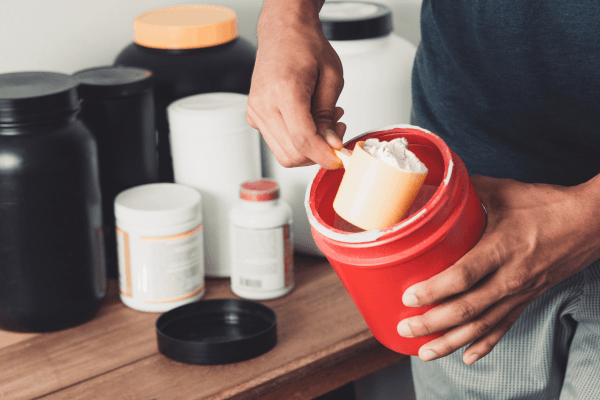What is a healthy plant based diet?
A healthy plant based diet focuses on nutrient rich plant foods while reducing consumption of oil, processed food and animal based food. It focuses more on food such as vegetables, fruits, lentils, pulses, soybeans, seeds, nuts. The diet is typically low in fat. However, a plant based diet may have different meanings for different individuals. Some individuals do occasionally consume milk products, fish, meat etc.
What is the difference between a vegan diet and a plant based diet?
Though a plant based diet and vegan diet fall along the same lines, they do have a small difference. A vegan diet completely excludes all animal based products such as eggs, milk and milk products, honey etc. Some individuals who have adopted for a vegan lifestyle may also refrain from using products which are sourced from animals/animal tested such as silk, cosmetics etc.
How does protein help with muscle building?
From a young age, we have learnt that proteins are body building foods. Protein is needed for growth, function and development. When you exercise, your muscle undergoes catabolism (breakdown). Dietary protein is needed to help with muscle recovery, repair and synthesis of new muscle. Muscle hypertrophy requires all the essential amino acids which are present in food protein. A complete protein will help in improving muscle strength.
How much protein do you need?
You need to eat protein every meal all days the week. 10-35% of your total daily calorie intake must come from proteins. The recommended daily allowance (RDA) is 0.8-1.0 grams per kilogram of body weight. However, if you lead a very active life you may need to consult a sports nutritionist to understand your requirement.
Is the biological value of plant proteins lesser than animal proteins?
The biological value or quality of any protein can be assessed by it’s amino acid profile. There are 21 amino acids. If a protein source has all the 21 amino acids it is a high biological value protein. Animal proteins are high biological value protein in comparison to plant based proteins. Muscle building requires high biological value proteins. However, there is no need to worry since you can still ensure you have a complete protein by combining pulses/lentils with cereal grains.
Cereals lack lysine while legumes lack methionine. Combining both of these in a meal can help you consume a complete protein.
Some examples are:
- Rice and soya beans
- Rice and peas
- Rice and dhal
- Rice and tofu
- Beans and tortillas
- Pasta and beans
- Bread and peanut butter
- Chickpeas and bulgar wheat
Is whey protein plant based?
Whey protein is made from the whey water which separates in the cheese making process. It is a complete protein but it is not plant based. There are many other varieties of plant based protein powders which are available in the market these days. They are made from peas, hemp seeds, white rice, soy beans etc. You could opt for this instead.
Plant based protein sources
If you still think that protein may be a hindrance in your muscle building journey, here is a list of plant based protein sources.
| Food source | Quantity | Energy (Kcal) | Protein (g) |
| Quinoa flour | 100g | 385 | 11.9 |
| Buckwheat | 1 cup | 356 | 11.1 |
| Amaranth flour | 100g | 378 | 13.2 |
| Hemp seeds | 1 tbsp | 76.8 | 3.6 |
| Chia seeds | 1 tbsp | 76.29 | 2.5 |
| Spirulina powder | 1 tbsp | 60 | 10g |
| Tempeh | 100g | 193 | 19 |
| Tofu | 100g | 76 | 8 |
| Edamame | 100g | 121 | 11.9 |
| Sunflower seeds | 1 tbsp | 87.6 | 3.12 |
| Flax seeds | 1 tbsp | 80.1 | 2.7 |
| Cooked lentils | 100g | 116 | 9 |
The importance of carbohydrates in muscle building
Eating a good amount of carbohydrates is still important on any muscle building journey. This is because, carbohydrates possess a protein sparing action. You need to have carbohydrates in your diet to ensure protein is not used as the source of energy for the body and rather it is used for other important bodily functions.
Celebrity examples of plant-based muscle builders
Many celebrities have turned to plant based diets with some following a vegan diet. The 7-time Formula One champion, Lewis Hamilton turned vegan in 2017. News articles report despite initial warnings by doctors, he experienced better energy levels and that clearer skin. He has also changed his dog’s diet to a vegan diet and feels that his coat and health are better too! Indian cricketer Virat Kohli has also adopted a vegan diet for health reasons. He also reports that he has better energy, clarity of mind and feels lighter.
Plant based pre and post workout nutrition
For your pre-workout meal:
- You can have a pre workout meal at least 2 hours before your intense workout session.
- Ensure you have more carbohydrates and good amount of proteins in your meal
- If you do not have enough time, you can choose to have something which is nutritious and digests easily such as banana-peanut butter shake or a fruit.
- This will ensure the meal gets digested and the body focuses on providing energy for your workout
- Avoid exercising on a full stomach to avoid discomfort.
For your post-workout meal:
- You need to eat your post workout meal within 45 minutes to replenish your body.
- Include lean proteins like tofu, lentils, tempeh etc. to build muscle along with carbohydrates to help restore your glycogen store (storage form of glucose in the body).
Protein rich plant based sample meal plan
Here is a sample meal plan you can enjoy on your plant based-muscle building journey. It is advised to speak to a nutritionist for a personalised meal plan as some of the food in the meal plan below may not be suitable for your body and health conditions.
| Meal ideas | |
| Upon arising | Lemon infused water |
| Breakfast | Green smoothie with berries and protein powder OR Oats vegetable dosa with peanut chutney |
| Mid-morning snack | Celery juice OR Tomato juice |
| Lunch | Tofu stir fry with steamed rice OR Dhal khichdi + spinach stir fry |
| Evening snack | Vegetables with hummus dip OR Makhana |
| Dinner | Legumes salad OR Chappati + tofu gravy |
Tips for plant based muscle building
- Use cold pressed oils like coconut oil, sesame oil, avocado oil etc.
- Rotate your vegetables and fruits to ensure you get all the necessary nutrients.
- Substitute dairy with plant based milk like home made almond milk, oat milk, hemp seed milk etc.
- Add herbs and spices to make your meals flavourful and interesting.
- Use a good quality plant based protein supplement.
- Calculate your daily protein and energy requirement based on your physical activity level.
- Eat plenty of vegetables.
- Have healthy plant based meat alternatives if you are craving meat.
- Never stay hungry, carry some snacks with you on the go.
- Make plant based desserts to suit your sweet cravings.
Several physicians are recommending a plant based diet for better health. It is suggested to speak to a health care provider before choosing a plant based diet because very individual is different.
Mayuri,
Clinical Dietitian, Simplyweight





